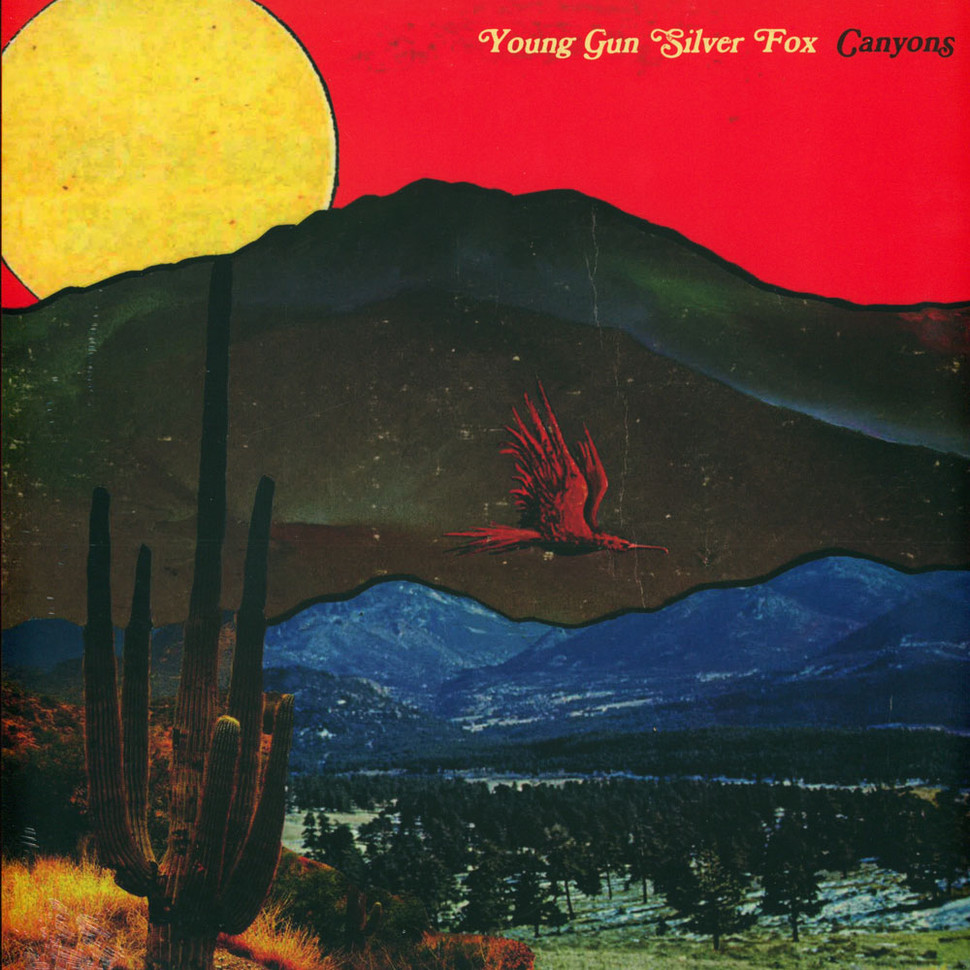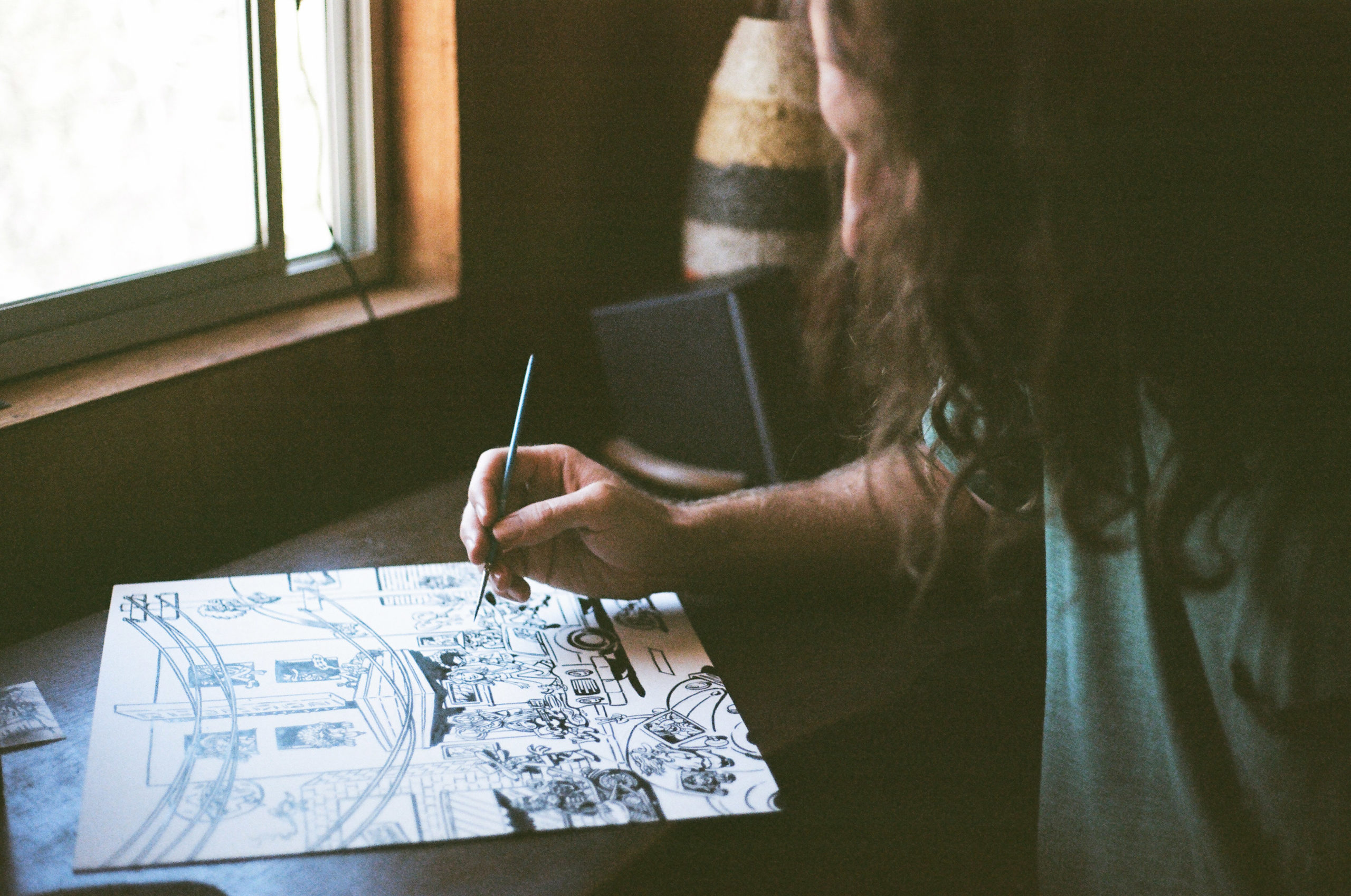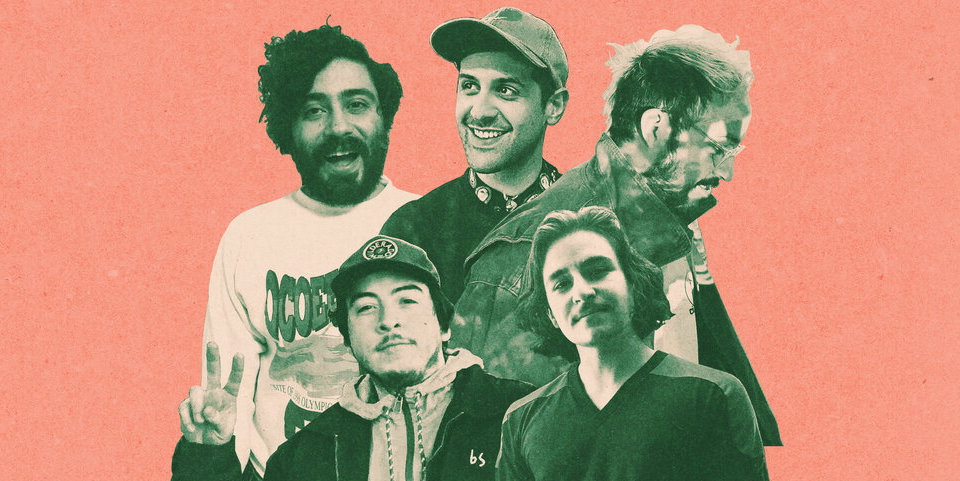By: Garrett Bethmann
There’s a line on Young Gun Silver Fox’s song “Who Needs Words” — of its impeccable new album Canyons — that sums up my feelings more or less for musician, producer, vibe-setter and Silver Fox Shawn Lee.
“I could write a thousand songs about you baby / And never really find the right way of saying/ Just what it is you are to me.”
Though he’s been almost omnipresent since my musical growth spurt in high school when I listened to the cool psychedelic explosion of Shawn Lee’s Ping Pong Orchestra’s Voices and Choices, it’s hard to really put together any coherent explanation for who Shawn Lee is to me, and to some extent, who he might be to the larger musical world. He’s less a musician and more a vibe, something you just feel and roll with.
For this reason, please don’t mind skipping these words and going straight for the music. I wouldn’t blame you, the music speaks louder and more convincingly than any one person can, especially me. But if you are sticking around for a little bit longer, at least put him on in the background.
Part of Shawn Lee’s gravitas is the sheer vastness of his discography and musical credits. Since the mid 90’s, Shawn Lee has recorded over 40 albums, either solo or with collaborators. He’s worked with big names like The Dust Brothers and Jeff Buckley, underground groove connoisseurs like Tommy Guerrero and Clutchy Hopkins, put out records on trendsetting Ubiquity Records and Colemine Records, and has created unique, go-with-the-flow collaborations with musicians like Andy Platts, Bei Bei He, and Carwyn Ellis.
That’s not to mention producing singles with a slew of artists, putting together movie and video game soundtracks, and licensing a number of songs for shows, movies and ad campaigns. He’s imprinted himself in the fabric of musical space time like a small planet, pulling current fans and future fans to his catalog with every spin of one of his records around the turntable.
“When you work with talented people, the key is to give them free reign to do what they are going to do. You fill in the blanks, you don’t get in the way of what they are trying to do. You don’t tell somebody what to do unless they need to be told. I’ll happily ride on someone else’s magic carpet,” said Lee.
The other bewildering aspect of Lee’s musicality is his incessant world building of rhythms, sound and space that is sophisticated, uniquely varied and seemingly boundless. He’s less a musical encyclopedia and more the Grand Maester of Groove who wrote the encyclopedia.
Take for example his recent output over just the last month. His album Canyons with Andy Platts as Young Gun Silver Fox is a sparkling cruise to the Catalina Wine Mixer in 1980, riding on the buoyant, bright legacy of pop’s yacht rock admirals like Hall and Oates and Michael McDonald. Unload at the dock, drive into the mountains and you are in another impressionistic world of psych-pop with Carwyn Ellis as Colorama, where their album Chaos Wonderland doesn’t feel anchored in any one time or place, meant to help you laze and blaze the day away along dusty switchbacks. As night falls, you’re whirled into Paradise Cove with Estonian Misha Panfilov, a galactic lounge amongst the stars that has a killer happy hour Mai Thai and hosts the best electronic bossa nova band this side of the Milky Way.
Shawn Lee’s music cannot be pigeonholed into any one genre or sound, his musicality connected by nothing but a love of living, breathing musicians making music together. You’ll hear it in the vivaciousness of the music, you’ll feel it in the life that bubbles inside of you, and you’ll see it in the smile that is bound to wrap around your face. The fact you might not be able to put words to it is a good thing, sometimes you don’t have to have it all figured out, you just gotta find the vibe that moves you. With Shawn Lee, you’ll always find that vibe.
“Who needs words when everything is crystal clear/ When happiness is so sincere across this universe.”

Read below for an interview with Shawn Lee. This interview has been edited for length and clarity.
Do you think have an ability to churn out ideas and materialize music in a quicker way than others? You just have so much releases under your belt.
I think the thing about myself I notice that sets me apart from a lot of other people is I’m good at finishing things. I trust my instinct. I believe in that adage, “first thought, best thought.” If it feels good, do it and finish it. I’m addicted to that idea of the next thing. The next thing is going to be the best thing and always moving forward and getting bogged down. I think spending too much time on something kills the vibe a bit. I’m not trying to make something perfect, just the best thing at that moment.
It’s not even up for me to decide what people gravitate towards or what they think of the music. Sometimes you think it’s the best thing you’ve ever done, but not other people are going to think that necessarily (laughs). It’s a subjective thing. Sometimes people work on it too much and they lose perspective, they lose that fresh perspective. Working fast and trusting my instincts and not ever overthinking things works. You allow yourself to keep moving and growing and fresh. Let the cards fall where they fall.
I wanted to talk to you first about Young Gun Silver Fox. How’d you cross paths with Andy Platts? What draws you to him as a collaborator?
We originally came across each other on Myspace (laughs). It was the beginning of social media but particularly for musicians it was a very fertile space, I came across a lot of musicians I liked and ended up collaborating with. I remember Andy and thinking this guy was good, we knew the same people and I said we should do something together sometime. I never heard back from him (laughs), then a couple years later he got in touch with me to produce an album for his band Mama’s Gun. We did a few things but it never really worked out with the band.
But we knew that when we worked together things clicked and I felt like he was the Hall to my Oates (laughs). For the music we make with Young Gun Silver Fox, I felt like I had found the perfect collaborator. It was something I had been wanting to do and when I connected with him, it was like this is the perfect thing.
It took a long time honestly, it took years, from us getting the idea of doing it, to starting it, to completing the first record. But there’s something special with the things we do together and he’s really talented individually and he’d say the same thing about me. I liken him to being like Michael Jordan, where if I am going to throw the ball to him, I know he’s going to score. You’re not worried about it, he’s always going to come through. It’s a really great thing to work with people like that, where you don’t have to explain anything to them or carry anybody. I do what I do, you do what you do, you put it together, it’s like peanut butter and jelly.
You mentioned in a previous interview that this late 70’s, early 80’s, yacht rock sound was very impactful for you as a musician. Why did this sound have a very big impact on you?
This music made a huge impact on me because it was on the radio as a kid and I listened to the radio a lot. The radio was a big thing, it was always on, so music was this magical device that would transport you to another world. That late 70’s, early 80’s stuff we might lump into AOR and yacht rock I think was some of the finest, most musical, most sophisticated radio pop music that’s ever existed.
The quality of the musicianship and production and the great songwriters and session musicians and bands, it was all super dialed and top-notch. They’re winning on every level, they’re on the radio and working with the best musicians and writers and people. This is like a high benchmark to be inspired by. When I started to write songs of my own and record them, it was still kind of in that yacht era. It’s like coming back full circle, that stuff is so deep in my DNA.
What do you learn from inhibiting one genre so in-depth, much like how an actor might learn things about a subject when they deep dive into an acting role?
This is the music that sets the standard. It’s not that we are trying to recreate it, we just want to do that kind of music as good as it can be done. The benchmark is quite high so you can’t come in half-cocked. We didn’t want it to be post-ironic, it wasn’t going to be an apologetic record or tongue in cheek. It was let’s take inspiration and influence from the finest music made of that era and build on that and start again. If people want to say it’s a throwback, I don’t care.
It felt really good to be doing something new that didn’t really have a scene for it. There have been bands that dabbled with this idea before but it kind of felt jokey and I felt like there was a space for myself that I really love and understand and capable of making. I have no contemporary peers for that. There’s a lot of people making contemporary soul music influenced by the 60’s and 70’s and a lot that do it quite well. But there’s a lot of people doing it, so it’s nice to have your own little thing and see other people getting inspired by what we are doing. In a way, we are re-legitimizing the music because there has been that reprisal in contemporary music for that type of music.
That type of music is so special to me and hits a deep spot. It’s so pleasurable to listen to and sing to and write and perform. It’s a really special rarified place that makes people happy and feel good. You couple that with the fact it’s really challenging to perform and write musically. It’s really challenging but really easy on the ears, it’s unique in that way (laughs).
Switching over to your work with Colorama. What’s the brainstorming process for you and Carwyn Ellis in trying to find your sound?
Carwyn is really unique, he’s like a musical encyclopedia in very much the same way I am. When we get together: “have you seen this documentary?”; “have you read this book?”; “you gotta listen to this record.” I’ve taught him about a lot of stuff he didn’t know about and vice versa, it’s a very cool exchange. He’s such a talented musician and songwriter, impeccable, he knows his stuff.
He’ll come in and have a record inside of his head. It sounds like L.A. Wrecking Crew with Bobby Darrin or something Willie Mitchell would do, an idea for the direction of it. Then he’ll lay down an acoustic guitar then another guitar, play a bass line, then a piano, then a scratch vocal. He’ll listen to it and go, “that’s not it, I thought it was this, but it’s that.” He’ll have to put a few things down to step back and see that maybe his idea was wrong. Then he’ll start to lay it down again. But he’ll lay it all down in single takes, no mistakes, going from one to the next (laughs).
You let him empty his clip and you look at it and have a discussion and get into the production and sound. As a songwriter he has such a deep palette of writing, he can write so many different types of songs. He can do minimal lyrical things with allegory or a well crafted piano thing, or finger-picking guitar or funk, so many things to dip into. He knows the nuts and bolts of songcraft more than really anybody I’ve ever worked with, he’s a real chameleon. I went to Brazil with him in December and there’s another record we are going to finish up in the fall that has a lot of Latin influences in it. He’s one of my favorite musicians.
As you mentioned, you are such an encyclopedic resource for music. In that sense, are there certain trends you see in the way musicians approached music or thought about music from the 70’s that may have changed or evolved to where musicians nowadays create from? Has the creative process changed significantly in your view?
I think recording music and technology have always gone hand in hand. The way records have been made has always been changing from decade to decade. Early on in record making, it was people playing together at the same time and it was about getting a performance and people really having to nail it and get it right. That was the 50’s and 60’s, then when you got into the 70’s it got into more tracks and people wanted to isolate things and get overdubbing. So people weren’t playing live as much and you could get very into the details of what can we do with the new way of working. Something was gained and something was lost, just like with every technological advance.
People get obsessed with sonic perfection and things being in time and things being in perfect pitch and things being exact. The more you concentrate on those things, the less feeling there is, the less trying to capture a moment doing something magical in a bottle. That’s the kind of thing live music has when it is right, it takes you somewhere. There is an idea among a lot of younger musicians of wanting to go back to how records used to be made, which is why they’re playing instruments and playing live and playing to tape. They want to capture that magic, because the idea that anyone can record things on their phone and in their bedroom has become so easy. It’s all apps and software and it’s become generic and pedestrian. It’s about doing it with your own voice and message across and that’s the ultimate thing, it’s more important than how you make something.
That’s another thing that I think is different about me from a lot of other people I see, is being in the studio recording is a really fun thing. There’s a lot of humor in what I do and I’m having a great time, but there’s a lot of people who are really serious, they are going for that perfection. They can’t have a laugh about it, they are searching and intense. I’m searching as well, but you gotta enjoy the process. Enjoying that process is the light that comes through records that we really like. It’s living, breathing people who have a sound and a groove.
Whose music do you see on the frontier of the sonic landscapes? Who do you look to when you are looking for something new?
There’s some record labels where I like a lot of their stuff. Like Big Crown, I love all their stuff. I think Leon Michels sensibility I really relate too, he’s making modern music and obviously influenced by 70’s music and by music m with live instruments and analog. He’s not scared to change the musical template and can make more contemporary pop records. I would liken him to an artist that paints in colors, where others work in a more black and white manner. Daptone is more black and white, formulaic and in a box, one that I like, but they are keeping it in a really small space.
There’s so many great records being made now. A lot of people don’t think there is but there is a lot of great music about, it’s harder to find but it’s really strong. There’s a lot of people who wanna make live, breathing music and reattach themselves to the idea of how old records were made and recapture that spirit, keep it alive.
I think Mac Demarco is a guy I really like, I like where his direction went. Chicano Batman is a band I followed right from the beginning, I have all their records and I’ve played gigs with them and collaborated with Barto. I think they are a super great contemporary band and one of the best bands I’ve ever seen live. Really tight and really loose and an interesting combo of musicians and influences. I love how they sing in Spanish and English and they are not afraid of breaking formula.
I got this record by Edwin Birdsong. I’ve known about Birdsong for a long time and knew a couple of his records and a couple things that have been sampled by him. I knew him from the back of Roy Ayers records, so I was aware of him but I never owned any of his records. Then I bought one of his records and was like, “Wow.” This dude is really an individual. You can hear all the things of his time but it is not put together in a way that is obvious. The guy has an interesting take on it, very intense. It’s not for everybody, you can see why maybe he wasn’t as successful, people weren’t ready for it. It probably doesn’t make a lot of sense to people now. I’m not discovering him, I’m re-discovering him. There’s still loads of things out there.


